WRIGLEY FIELD
Wrigley Field is home of the Chicago Cubs, as it has been since 1916. It was built in 1914 as Weeghman Park for the Chicago Federal League baseball team, the Chicago Whales.
Field dimensions
Left Field - 355 ft
Left-Center Field - 368 ft
Center Field - 400 ft
Right-Center Field - 368 ft
Right Field - 353 ft
The park was built in six weeks in 1914 at a cost of about $250,000 ($5.3 million in 2008 dollars) by the Chicago lunchroom magnate Charles Weeghman, who owned the Federal League Chicago Whales.
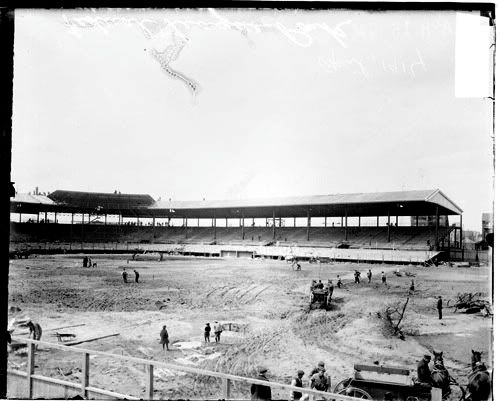
Babe Ruth taking batting practice before the 1932 World Series.
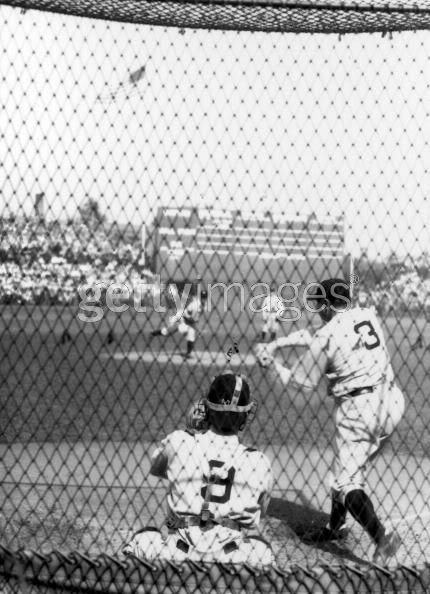
October 1, 1932. Fifth Inning of Game 3 of the 1932 World Series. Is it a "called shot" to center?
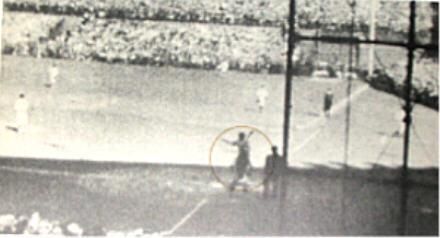
Aerial of Wrigley during 1935 World Series. You can see the temporary bleachers installed for the Series between the Cubs and the Tigers.
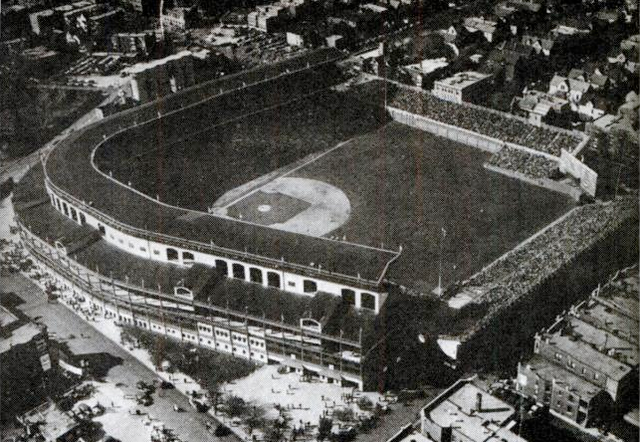
On Sept. 28, 1938, Cubs Hall of Fame catcher Gabby Hartnett hit his famous "Homer in the Gloamin" off the Pittsburgh Pirates Mace Brown. With the game about to be postponed because of darkness, Hartnett hit a game-winning homer to lift the Cubs to the pennant.
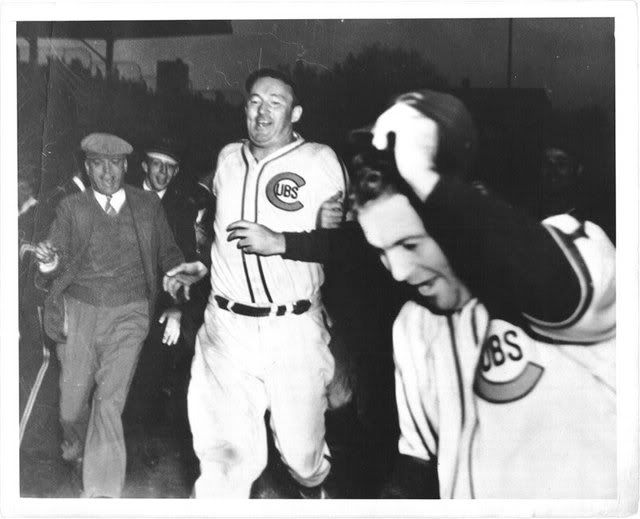
Aerial of Wrigley during 1938 World Series with the New York Yankees
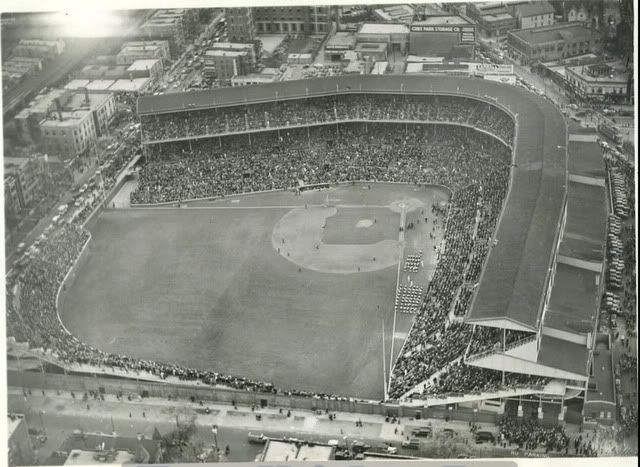
1938 World Series. Game Two. Players are labeled. This play occured in the 4th inning and is listed as double in the boxscore for Joe Gordon, but in actuality, Gordon hit a two-out slow roller just past the mound. Dizzy Dean couldnt make the play, and Stan Hack and Billy Jurges collided, scoring DiMaggio and Gehrig and resulting in a "double" for Gordon. The ball is marked with an arrow.
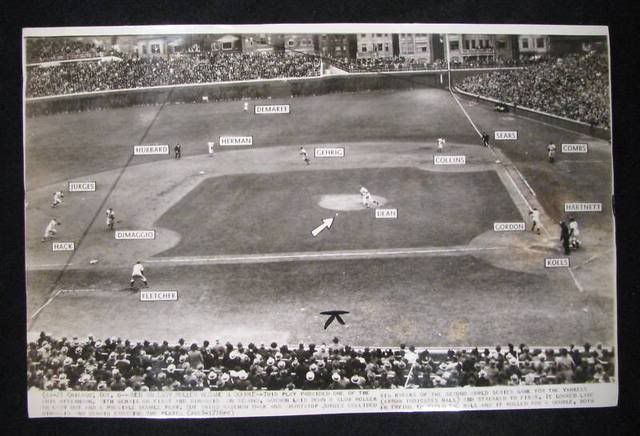
Wrigley during the 1940s
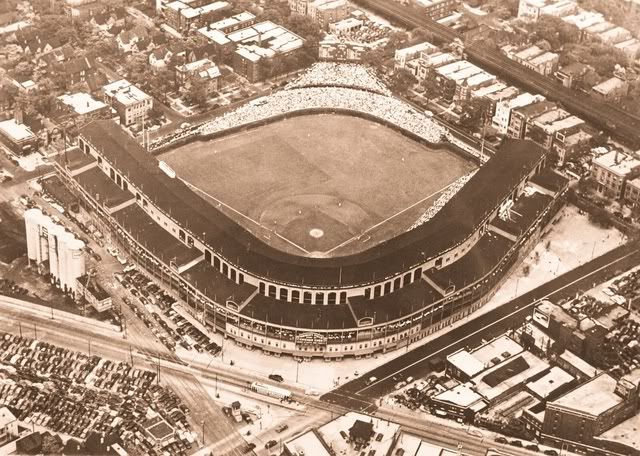
Fans line up for tickets for the 1945 World Series between the Cubs and Tigers.
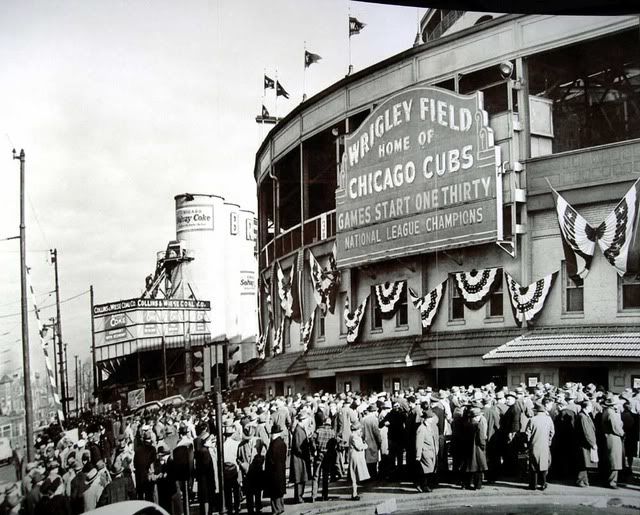
Preparing Wrigley for the 1961 season. The groundskeeper is working on the ivy, while the guys on the scaffolding are adding another line in the scoreboard to accomodate the extra American League game that would be taking place in expansion year of 1961. Also, a close look at the scoreboard will show that the Cubs and White Sox are slated to play an exhibition game......
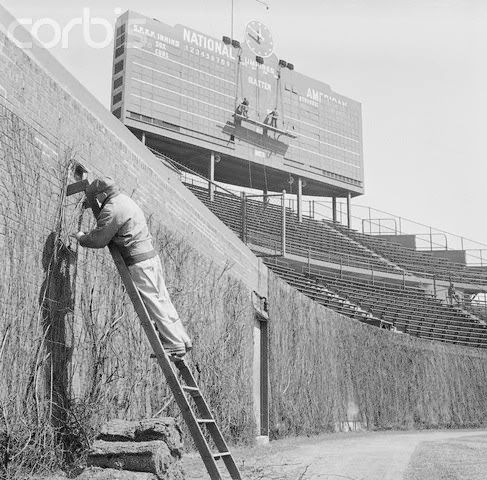
The 27-foot-high, 75-foot-wide scoreboard was built in 1937 by Bill Veeck. Its top is 85 feet above the field. The 10-foot-diameter clock was added in 1941.
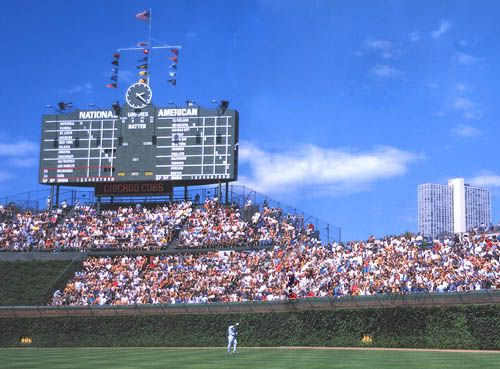
The famous Wrigley Field marquee, which was installed in 1934. The electronic message capability was added in 1982. It hasn't said that too often.
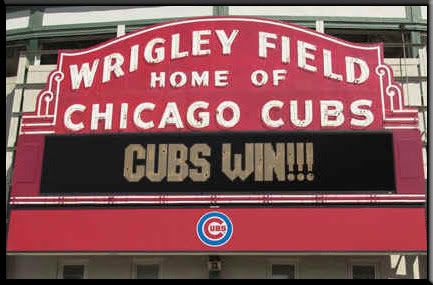
View of the left-field wall. The installation of bleachers in centerfield gave Wrigley its odd configuration, with the wall jutting out as it approaches both foul lines.
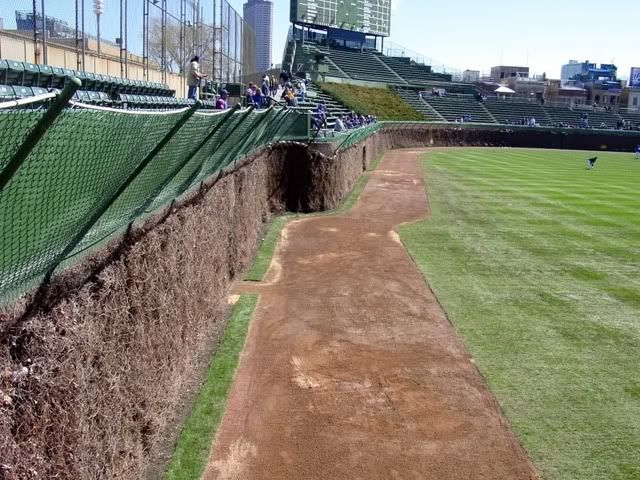
The neighborhood surrounding Wrigley is unique in baseball. Here, fans are watching the game from atop buildings across Sheffield Street.
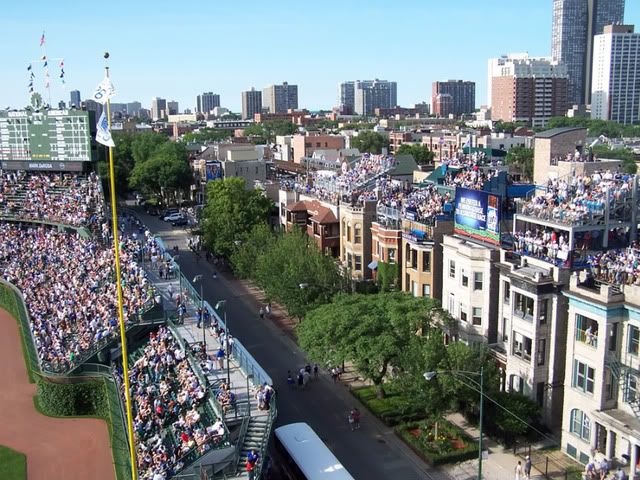
Mr. Cub, Ernie Banks
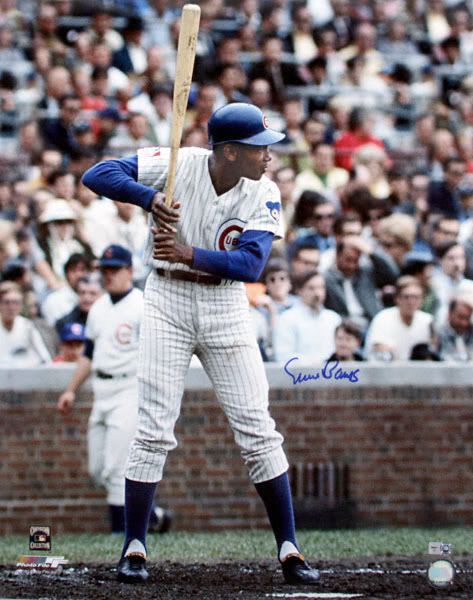
Billy Williams
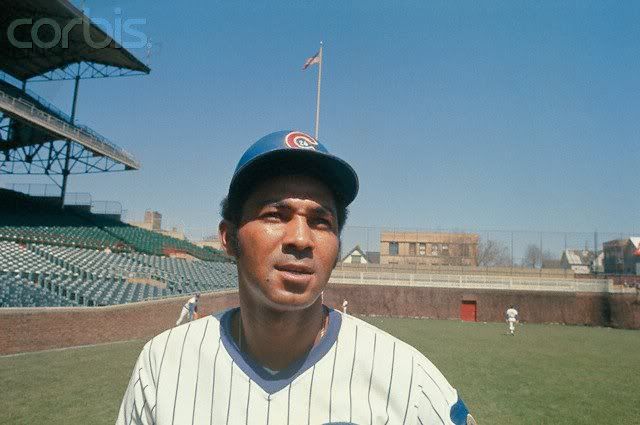
Ryne Sandberg
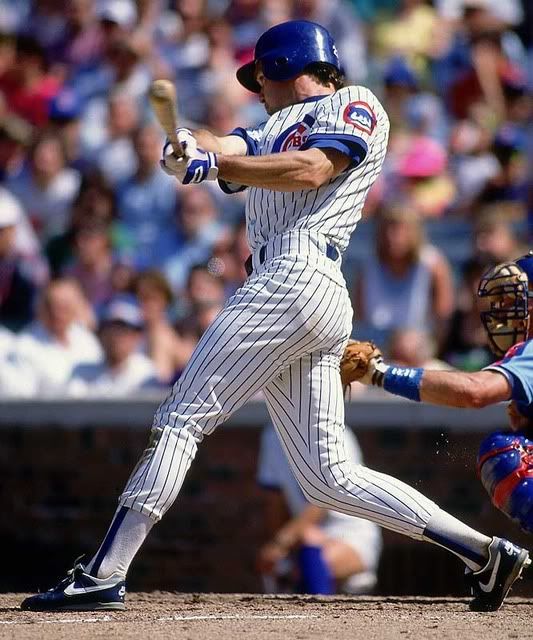
Nice aerial of Wrigley showing the outfield configuration
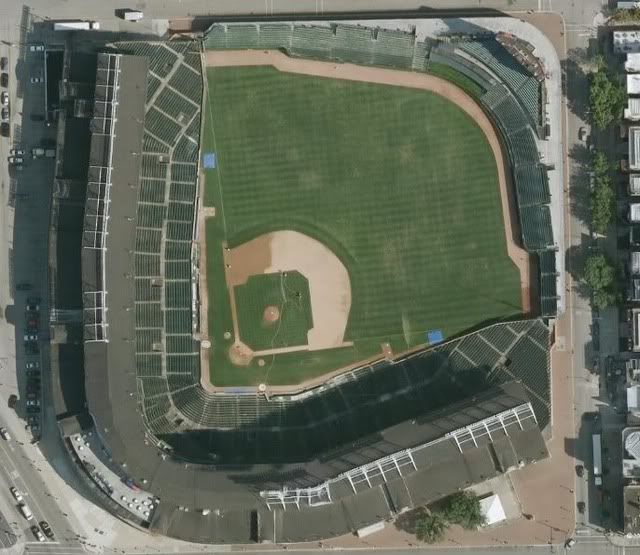
Wrigley Field today
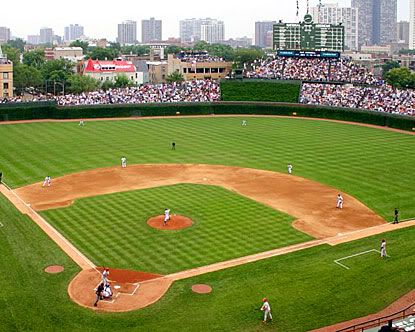
Wrigley. Looks like a beautiful day for a ballgame....let's play two.
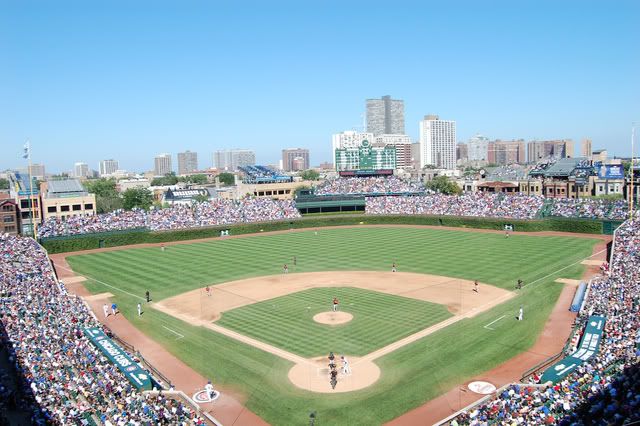
Field dimensions
Left Field - 355 ft
Left-Center Field - 368 ft
Center Field - 400 ft
Right-Center Field - 368 ft
Right Field - 353 ft
The park was built in six weeks in 1914 at a cost of about $250,000 ($5.3 million in 2008 dollars) by the Chicago lunchroom magnate Charles Weeghman, who owned the Federal League Chicago Whales.

Babe Ruth taking batting practice before the 1932 World Series.

October 1, 1932. Fifth Inning of Game 3 of the 1932 World Series. Is it a "called shot" to center?

Aerial of Wrigley during 1935 World Series. You can see the temporary bleachers installed for the Series between the Cubs and the Tigers.

On Sept. 28, 1938, Cubs Hall of Fame catcher Gabby Hartnett hit his famous "Homer in the Gloamin" off the Pittsburgh Pirates Mace Brown. With the game about to be postponed because of darkness, Hartnett hit a game-winning homer to lift the Cubs to the pennant.

Aerial of Wrigley during 1938 World Series with the New York Yankees

1938 World Series. Game Two. Players are labeled. This play occured in the 4th inning and is listed as double in the boxscore for Joe Gordon, but in actuality, Gordon hit a two-out slow roller just past the mound. Dizzy Dean couldnt make the play, and Stan Hack and Billy Jurges collided, scoring DiMaggio and Gehrig and resulting in a "double" for Gordon. The ball is marked with an arrow.

Wrigley during the 1940s

Fans line up for tickets for the 1945 World Series between the Cubs and Tigers.

Preparing Wrigley for the 1961 season. The groundskeeper is working on the ivy, while the guys on the scaffolding are adding another line in the scoreboard to accomodate the extra American League game that would be taking place in expansion year of 1961. Also, a close look at the scoreboard will show that the Cubs and White Sox are slated to play an exhibition game......

The 27-foot-high, 75-foot-wide scoreboard was built in 1937 by Bill Veeck. Its top is 85 feet above the field. The 10-foot-diameter clock was added in 1941.

The famous Wrigley Field marquee, which was installed in 1934. The electronic message capability was added in 1982. It hasn't said that too often.

View of the left-field wall. The installation of bleachers in centerfield gave Wrigley its odd configuration, with the wall jutting out as it approaches both foul lines.

The neighborhood surrounding Wrigley is unique in baseball. Here, fans are watching the game from atop buildings across Sheffield Street.

Mr. Cub, Ernie Banks

Billy Williams

Ryne Sandberg

Nice aerial of Wrigley showing the outfield configuration

Wrigley Field today

Wrigley. Looks like a beautiful day for a ballgame....let's play two.
